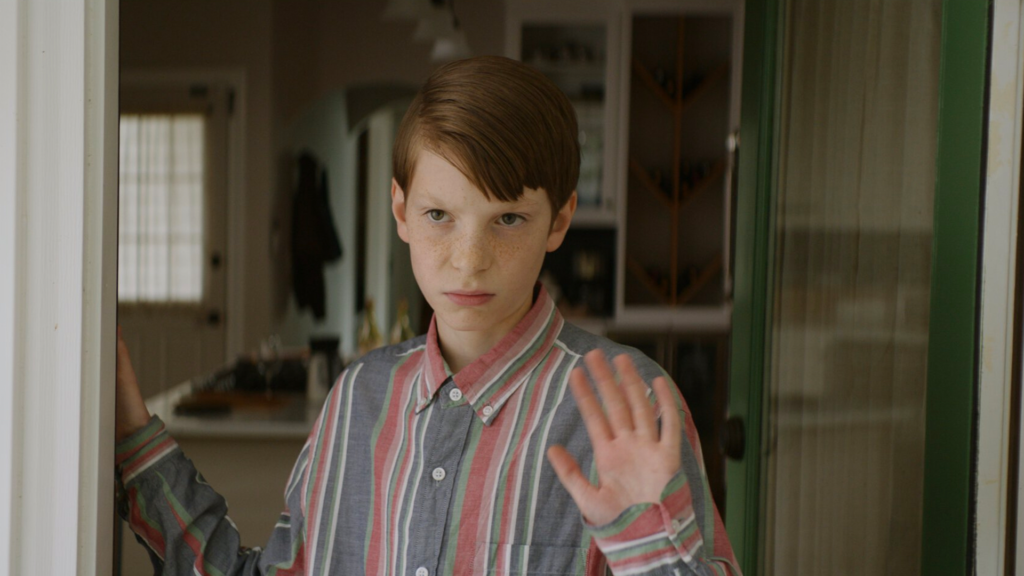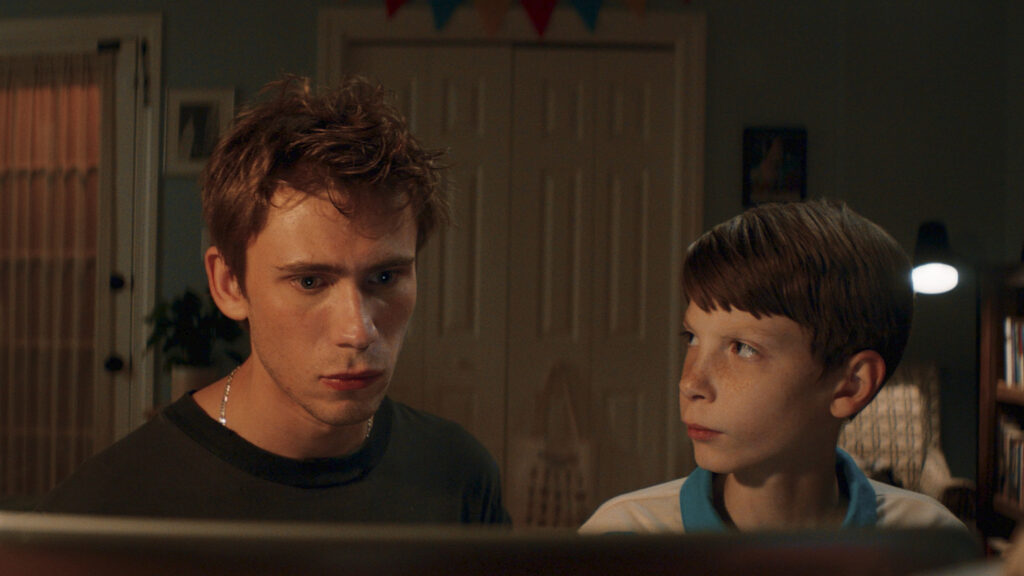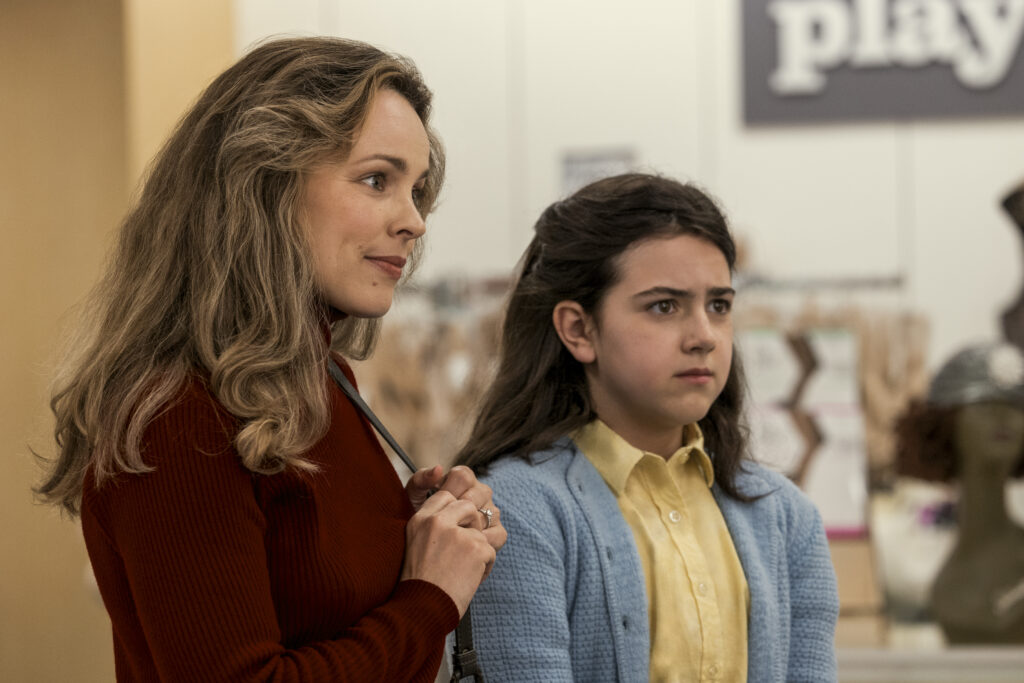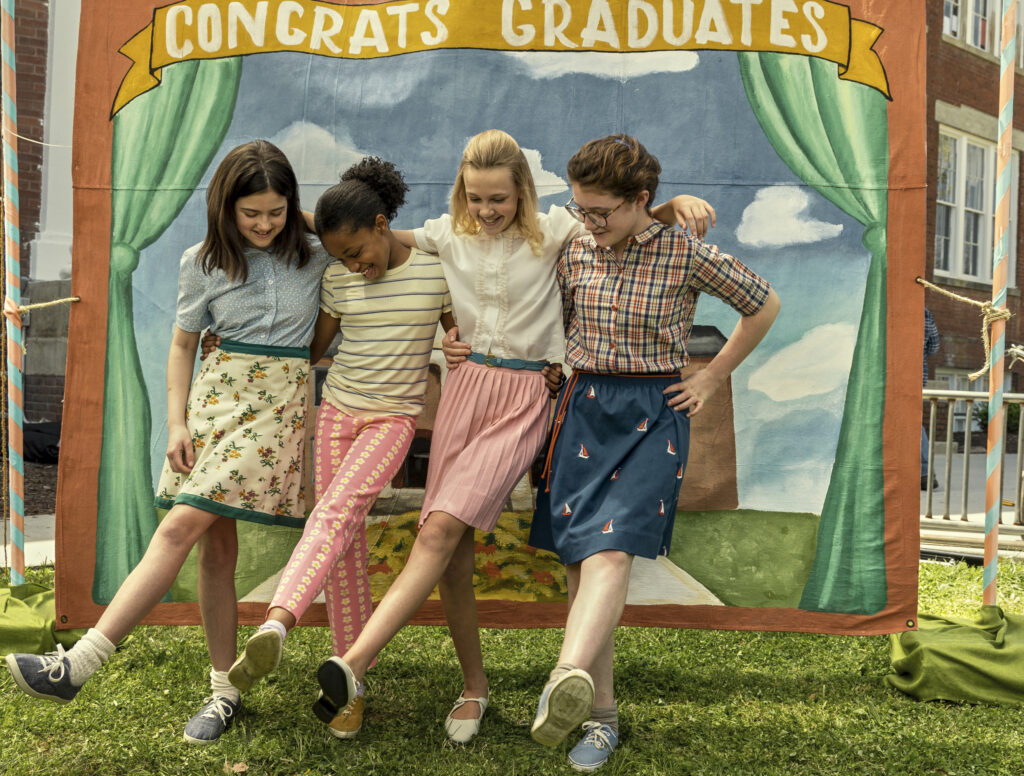June 24, 2024
by Carla Hay

“Griffin in Summer”
Directed by Nicholas Colia
Culture Representation: Taking place in the fictional city of Borwood, Virginia, the comedy/drama film “Griffin in Summer” features a predominantly white cast of characters (with a few Latin people) representing the working-class and middle-class.
Culture Clash: A 14-year-old boy is obsessed with having a professional production of his latest play, and he unexpectedly gets distracted by his attraction to a young handyman who has been hired to do work at his house.
Culture Audience: “Griffin in Summer” will appeal primarily to people who are fans of the movie’s headliners and movie about queer young people discovering their sexual identities.

“Griffin in Summer” capably handles the nuances of telling the story of a teenage boy’s sexuality awakening without veering into lurid exploitation. The performances in this comedy/drama are memorable, even when the plot occasionally gets one-note. The movie’s protagonist is believable because he’s not a caricature and has very realistic personality flaws.
Written and directed by Nicholas Colia, “Griffin in Summer” had its world premiere at the 2024 Tribeca Festival, where it won two prizes: Best U.S. Narrative Feature and Best Screenplay (U.S. Narrative Feature). In addition, Colia received a special jury mention (the equivalent of second place) for the Best New Narrative Director Award. “Griffin in Summer” takes place in the fictional city of Borwood, Virginia. The movie was filmed on location in Virginia.
“Griffin in Summer” is a movie about a 14-year-old boy who gets a clear understanding that he’s gay or queer, even though he doesn’t have any sexual encounters in the movie. “Griffin in Summer” handles this sensitive subject with a tone that is frank without being explicit. For example, there are no sex scenes in the film or even discussions of homosexuality or queerness. The words “gay” and “queer” aren’t even said in this film to describe the teenage protagonist. Everything is presented in a matter-of-fact way, without any big, dramatic “coming out” moments.
“Griffin in Summer” begins by showing a student talent show at Borwood Middle School. This talent show takes place shortly before the school will be on a summer break. A boy named Mark (played by Ian Hernandez-Oropeza) and an unnamed girl (played by Aurora Richards) on stage are singing an off-key duet of Chicago’s 1984 hit “You’re the Inspiration.” Even though it’s a horrible performance, the audience politely claps.
Next up is 14-year-old Griffin Nafly (played by Everett Blunck), whose personality can best be described as precocious and prickly. Griffin is an aspiring playwright and has chosen to act out a scene from his play “Regrets in Autumn.” In this play excerpt, Griffin acts out the roles of an unhappily married couple named Harriet (a homemaker in her 50s) and her husband Walter, who’s a Wall Street banker.
Harriet accuses Walter of cheating on her. Walter accuses Harriet of abusing alcohol. It leads to a shouting match where Harriet blurts out: “Oh, and another thing, Walter: Those weren’t miscarriages. They were abortions!”
Needless to say, the audience of mostly students are taken aback by this intense drama and are stunned into mostly silence. Griffin doesn’t seem to care that only a small percentage of people are clapping with tentative applause. His performance got the desired effect of making everyone in the room pay attention to Griffin and his work. Griffin has big plans for this play, which he’s determined to make a reality before he starts high school after his summer break.
At home, Griffin’s supportive mother Helen (played by Melanie Lynskey), who works as a real-estate agent, asks Griffin (who is an only child) if he has any plans to “do anything else” for the summer. Griffin curtly tells her no. That’s because for this summer, Griffin has a single-minded goal to stage his first play in a real theater, which will be the first time any of his plays will be in a legitimate performing arts space instead of the basement of his parents’ home. The play, of course is “Regrets of Autumn,” which Griffin describes as “Who’s Afraid of Virginia Woolf?” meets “American Beauty.”
Griffin plans to rent a small performance theater space “somewhere outside of Borwood” for the production. He has already decided who in his small circle of friends will be on his team for this production. Tyler Smoot-Rigsby (played by Gordon Rocks) will have the role of Walter, whom Griffin describes a “serial adulterer.” Winnie Hernandez (played by Johanna Colón) will have the role of Harriet, whom Griffin describes as an “alcoholic.” Pam Vanderworm (played by Alivia Bellamy) has the role of Scarlett, who is Walter’s “social-climbing mistress.”
Kara Pointer (played by Abby Ryder Fortson), who seems to be Griffin’s best friend, has been given the task of directing the play. However, it soon becomes very apparent that Kara has this title of “director” in name only because Griffin is the real director of the play, based on how he acts and the decisions that he makes. It would not be an exaggeration to describe Griffin’s bossy attitude toward his teammates as tyrannical and difficult.
Griffin wants intensive rehearsals that would require 60 hours week. It’s a lot to ask from any anyone—let alone an underage teen—to give up that much of their time for an amateur, unpaid play. When Kara speaks on behalf of the castmates about this demanding work schedule and asks for them to rehearse for less hours per week, Griffin has this hostile reaction: “It’s the Equity standard!” (Griffin conveniently forgets that the Actors Equity Association standard also includes union-approved payments and insurance benefits, which obviously Griffin cannot offer.)
In the meantime, Griffin has been frantically putting the finishing touches of the play. He expects to work on the play in quiet solitude in his room. But those plans are disrupted when Griffin finds out that his mother has hired the young adult son of a neighbor named Mrs. Rizzo (played by Francine Berk) to do some handyman work inside and outside the Nafly family home. This handyman work inevitably involves using equipment noises that irritate Griffin.
The name of this handyman is Brad Rizzo (played by Owen Teague), who is an aspiring performance artist. Brad is not intellectual but he’s good-looking in a “lanky and laid-back” type of way. The first time Brad makes his noisy presence known, he’s doing some work on the front lawn, Griffin haughtily orders Brad to stop making noise because Griffin is working on writing a play. “Art comes from a quiet place,” Griffin tells Brad in a snooty tone.
Griffin wants Helen to fire Brad. She refuses. As Brad spends more time at the house, it soon becomes obvious that Griffin is attracted to Brad in a way that makes Griffin feel excited, confused and fearful at the same time. Griffin’s attraction to Brad becomes even stronger when he finds out that Brad is an aspiring performance artist who is only in Virginia to make enough money so Brad can go back to New York City and pursue his real goals of being a professional performance artist.
The rest of “Griffin in Summer” is how Griffin handles his feelings toward Brad while still juggling the stress of launching his “Regrets in Autumn” play. Things get complicated for Griffin when he finds out that Brad has a possessive and insecure girlfriend named Chloe (played by Kathryn Newton), who has known Brad since she and Brad were in high school. Without giving away too much information, it’s enough to say that “Griffin in Summer” pokes some fun at how power dynamics and decision making can change when sexual attraction is part of the mix.
“Griffin in Summer” also has a subplot about how the somewhat troubled marriage of Griffin’s parents affects Griffin’s outlook on life. Griffin’s father Bill (played by Michael Esper) is frequently away from home because of his job. This absence has taken a toll on his marriage to Helen. At one point, Griffin hints that Helen has a substance abuse problem when he tells someone that Helen is “only into Chardonnay and Klonopin.”
As a character, Griffin has a few predictable stereotypes that are often given to queer male characters in movies. Griffin is sassy, fussy and has more than his share of “drama queen” meltdowns. However, the dialogue in the movie rarely strays from sounding authentic. If stereotypes exist for a reason, at least Griffin embodies those stereotypes in a believable way that don’t make him look like a caricature.
What’s special about “Griffin in Summer” is that it does the opposite of what many movies often do that are about underage teens discovering their sexuality: It doesn’t make any of the teens in the film in a rush to lose their virginities. And these teens aren’t fixated on sex and don’t make constant crude jokes about sex, which are other predictable clichés in teen-oriented movies with sexuality as a major theme. Griffin and his friends are still in their early teens and don’t have to be portrayed as if they’re horny 17-year-olds.
Blunck gives a very expressive performance where his face and body language show a lot of what Griffin is really thinking. Meanwhile, Teague gives a credible performance as Brad, who doesn’t initially pick up on the queer signals that Griffin is giving. Brad mistakenly thinks that Griffin is growing attached to Brad because Griffin sees Brad as being like an older brother.
Lynskey gives a solid performance as a harried mother trying to keep her family together, Helen seems to know that Griffin is gay or queer, but it doesn’t seem to be something she wants to discuss with Griffin until he’s ready to talk about it. Newton’s portrayal of ditsy Chloe is intentionally campy. The other supporting cast members give good performances in their very limited roles.
Doing a movie about teenage sexual identity is a tricky thing to do in a movie when the protagonist is under the legal age of sexual consent and the protagonist has a crush on an adult. “Griffin in Summer” isn’t just about sexuality; it’s also about self-acceptance. Through ways that are comedic and often poignant, “Griffin in Summer” shows that it’s much easier to put a label on a sexual identity than it is to have the self-confidence to live authentically, no matter how much it might hurt.


